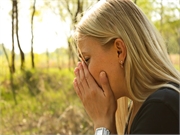SATURDAY, March 7, 2020 (HealthDay News) — While many Americans are ready to celebrate the end of winter, those with seasonal allergies are already dreading the sneezing, wheezing, itchy eyes and runny nose that spring brings.
“Spring allergies can be tricky to treat because not everyone is allergic to the same things, even though symptoms may look a lot alike,” said Dr. J. Allen Meadows, president of the American College of Allergy, Asthma and Immunology. “There are some really effective treatments out there, but unfortunately no magic bullets.”
Knowing what you’re allergic to is the key to dealing with spring allergy symptoms, he noted.
Meadows’ advice? See an allergist to find out what you’re allergic to and to learn about the most appropriate ways to treat your allergies.
Then, be prepared. Start taking allergy medications two to three weeks before you expect symptoms to begin, he urged in a college news release. That will make them easier to control. Remember: The start of allergy season depends on where you live.
If you’re allergic to pollen, take steps to keep it out of your home, car and clothes, as well as your hair, eyes and nose. Keep windows in your house and car closed in the spring. After being outdoors, remove your shoes when you go inside and consider immediately washing your clothes to remove pollen. Shower at night before bed to make sure your hair doesn’t transfer pollen to your bedding.
Some parts of the United States get harder hit than others, but tree pollens are bad in every region. That said, research shows that hay fever is more common among children in southeastern and southern states. But no matter where you live, if you’re sensitive to tree pollen or grass, you can expect a seasonal increase in allergy symptoms.
If over-the-counter remedies don’t help, see a doctor, Meadows advised. Immunotherapy — allergy shots or tablets — is one of the best ways to treat allergies, and an allergy specialist can prescribe the right treatment for you.
More information
The Asthma and Allergy Foundation of America has more on pollen allergies.
Copyright © 2026 HealthDay. All rights reserved.

